新版人教版英语七年级下总复习Unit 1_4 学案分解
- 格式:docx
- 大小:61.88 KB
- 文档页数:13
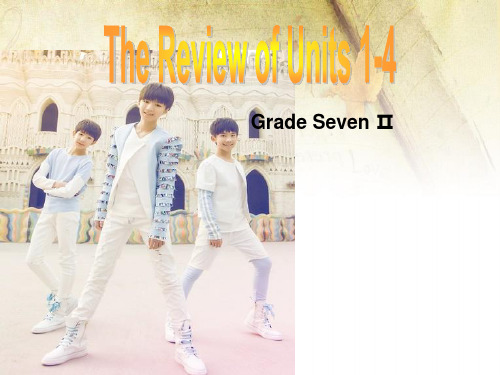
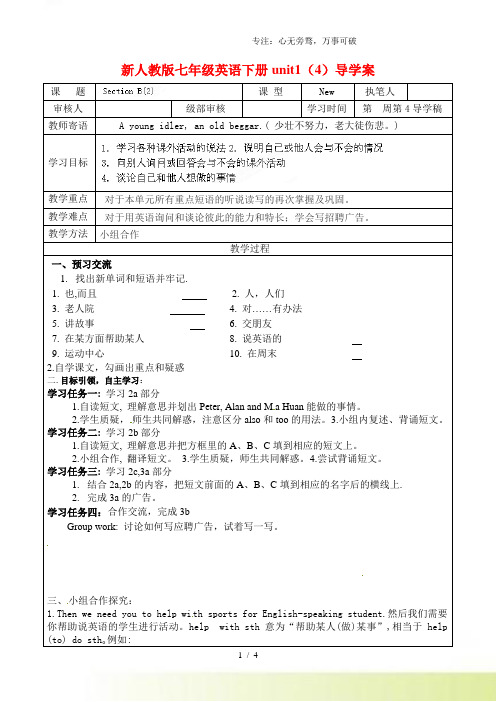
新人教版七年级英语下册unit1(4)导学案课题课型New 执笔人审核人级部审核学习时间第周第4导学稿教师寄语 A young idler, an old beggar.( 少壮不努力,老大徒伤悲。
)学习目标教学重点对于本单元所有重点短语的听说读写的再次掌握及巩固。
教学难点对于用英语询问和谈论彼此的能力和特长;学会写招聘广告。
教学方法小组合作教学过程一、预习交流1.找出新单词和短语并牢记.1. 也,而且_________________2. 人,人们________________3. 老人院_______________4. 对……有办法___________5. 讲故事___________________6. 交朋友__________________7. 在某方面帮助某人___________ 8. 说英语的_______________9. 运动中心___________________ 10. 在周末_______________2.自学课文,勾画出重点和疑惑二.目标引领,自主学习:学习任务一:学习2a部分1.自读短文, 理解意思并划出Peter, Alan and M a Huan能做的事情。
2.学生质疑,师生共同解惑,注意区分also和too的用法。
3.小组内复述、背诵短文。
学习任务二:学习2b部分1.自读短文, 理解意思并把方框里的A、B、C填到相应的短文上。
2.小组合作, 翻译短文。
3.学生质疑,师生共同解惑。
4.尝试背诵短文。
学习任务三:学习2c,3a部分1.结合2a,2b的内容,把短文前面的A、B、C填到相应的名字后的横线上.2.完成3a的广告。
学习任务四:合作交流,完成3bGroup work: 讨论如何写应聘广告,试着写一写。
_______________________________________________________________________________________________________________________________________________________________ _________________________________________________________________________________三、小组合作探究:1.Then we need you to help wi th sports for English-speaking student.然后我们需要你帮助说英语的学生进行活动。


本文由一线教师精心整理/word 可编辑1 / 1 新人教版七年级英语下册Unit1-4导学案上课时间: 年 月 日 编号:4 备课组长签字: 蹲点领导签字: 班级: 小教师复备栏或学生 课题 Unit 1 Can you play the guitar?(Section B 2a-selfcheck ) 课型 :听说课 课时: 2课时 主备: 复备: 教师复备栏或学生笔记栏:学习目标: 1、我要学会2a-selfcheck 中的重点词汇。
2、我能读懂小文段并能解决实际问题。
3、我能在与同伴的合作中收获成功,提升自我。
Step 1 New words and new phrases 。
1. Review 敲鼓 弹钢琴 拉小提琴 也;而且 在养老院 善于应付…的 结交朋友 在今天 在某方面帮助(某人) 体育中心 在周末 教我们英语 音乐家 2.New phrases 说英语 和人们做游戏 说英语的学生 学生活动中心 擅长讲故事 学校音乐节 3.New sentences 1.他也会踢足球。
______________________________ 2.我喜欢打篮球。
_____________________________ 3.七月你有空吗?____________________________ 4.学校需要帮助教音乐。
step 2 Practiceplete 2a.2. Complete 2b.3. Complete 2c.4. Complete 3a.Step3 Exercise(一)3b Make poster. Ask for help with an event at your school.(二)Selfcheck1. Add more words and phrases in each box.2.Add as many words as you can to make phrases.3.What can you do? What can ’t you do? What about the people youknow?Write at least five sentences.Step 5 反思本节课你学到了那些新知识?。

课时计划第周星期年月日课题 Unit 4: I want to be an actor.(Section A)教学目的 In this unit, students learn to talk about jobs.重点难点 1. Know the names of the different jobs2. Know what your group members’ parents do教具 Tape-recorder, some pictures , slides教学方法 Task-based, conversation教学过程教学过程Section ABrainstorm with students a list of jobs that friends or relatives do. ("Brainstorming" is an activity in which you set a topic and students say whatever words they can think of relating to that topic.) Write the word jobs on the board and list all the jobs students mention.Point to the jobs one by one and ask students to say what ever they can about these jobs. Accept single word answers or simple sentences such as, It's fun. It's a good job.la This activity introduces the key vocabulary.Focus attention on the art. Ask students to tell what they see in each scene. Ask students to name as many of the jobs shown as they can. Then point to a scene, name the job, and ask students to repeat.Point to the numbered list of words. Say each one and ask students to repeat.Then ask students to match each word wllfa one of the scenes. Say, Write the letter of each scene next to one of the ivords. Point to the sample answer.1 b This activity gives students practice in understanding the target language in spoken conversation.Point to the different people shown in the picture. Ask various students to tell what they do as you point to each one,Say, Now you will hear three conversations. The conversations are about three of the people in this picture.Play the recording the first time. Students only listen.Play the recording a second time. This time ask students to write a number 1 next to the person being talked about in conversation 1. Have students put a 2 and 3 next to the people being talked about in conversations 2 and 3.Correct the answers.1 c This activity provides guided oral practice using the target language-Ask a student to read the example conversation with you. Hold up the book and point to the doctor in the picture.Say, Now work with your partner. Make your own conversations about the picture. You can use sentences like the ones in activity 1b.Say a dialogue with a student. Point to a picture of one of the people. Guide the student to answer using one of the words in activity 1a.As students work in pairs, move around the room monitoring their work. Other language or pronunciation support as needed.2a This activity gives students practice in understanding the target language in spoken conversation.Ask students to look at the three pictures. Ask different students totell you what they sec in each picture. What are the people doing? What jobs do they have?Play the recording the first time. Students only listen. Say, You will hear conversations about the people in these pictures.Play the recording a second time. Say, Write the number of each conversation below the picture of the person being talked about.Correct the answers.2b This activity gives students practice in understanding the target language in spoken conversation.Point to the three headings in the chart and read the headings to the class. Ask students, What does "wants to be" mean? (It is not the Jobthe person likes now. It is the job the person wants in the future.)Play the recording the first time. Students only listen. Say, You will hear about the people in these pictures. You will hear the job they haw now and the job they want in the future.Play the recording a second time. This time ask students to fill in the blanks with the jobs the people have now and the ones they want in the future. Point out the sample2c This activity provides guided oral practice using the target language.Point out the pictures in activity 2a. Ask who each person is. (They are Susan's brother. Anna's mother, and Tony's father.)Say, Now work with your partner. Ask and answer questions about the pictures. Ask, "What does he or she do?" Then ask, "What does he or she want to be?"Say a dialogue with a student. Point to Anna's mother and then to the example in the speech balloons. Practice the dialogue with a student.As students work In pairs, move around the room monitoring their work. Offer language support as needed.板书设计 Unit 4: I want to be an actor.(Section A)What do you do? I'm a reporterWhat does he do.' He's a student.What do they do? They’re reportersWhat does she do? She's a student.教学后记。
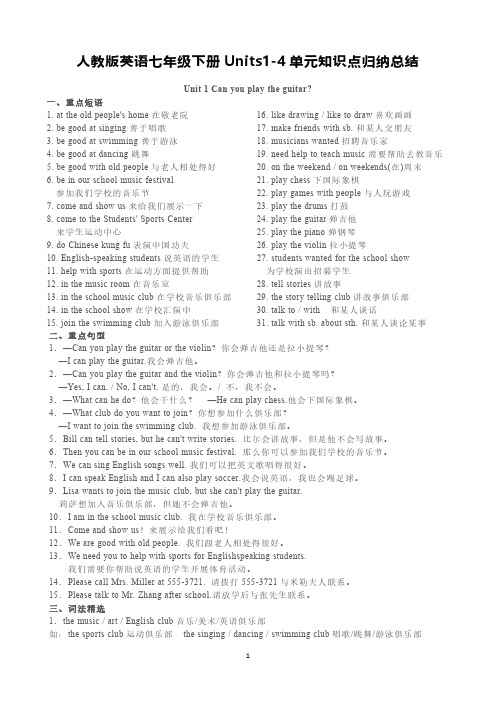
人教版英语七年级下册Units1-4单元知识点归纳总结Unit1Can you play the guitar?一、重点短语1.at the old people's home在敬老院2.be good at singing善于唱歌3.be good at swimming善于游泳4.be good at dancing跳舞5.be good with old people与老人相处得好6.be in our school music festival参加我们学校的音乐节e and show us来给我们展示一下e to the Students'Sports Center来学生运动中心9.do Chinese kung fu表演中国功夫10.English-speaking students说英语的学生11.help with sports在运动方面提供帮助12.in the music room在音乐室13.in the school music club在学校音乐俱乐部14.in the school show在学校汇演中15.join the swimming club加入游泳俱乐部16.like drawing/like to draw喜欢画画17.make friends with sb.和某人交朋友18.musicians wanted招聘音乐家19.need help to teach music需要帮助去教音乐20.on the weekend/on weekends(在)周末21.play chess下国际象棋22.play games with people与人玩游戏23.play the drums打鼓24.play the guitar弹吉他25.play the piano弹钢琴26.play the violin拉小提琴27.students wanted for the school show为学校演出招募学生28.tell stories讲故事29.the story telling club讲故事俱乐部30.talk to/with和某人谈话31.talk with sb.about sth.和某人谈论某事二、重点句型1.—Can you play the guitar or the violin?你会弹吉他还是拉小提琴?—I can play the guitar.我会弹吉他。
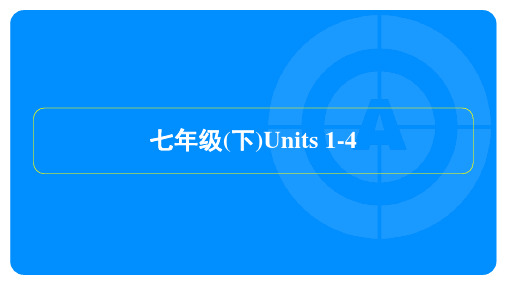
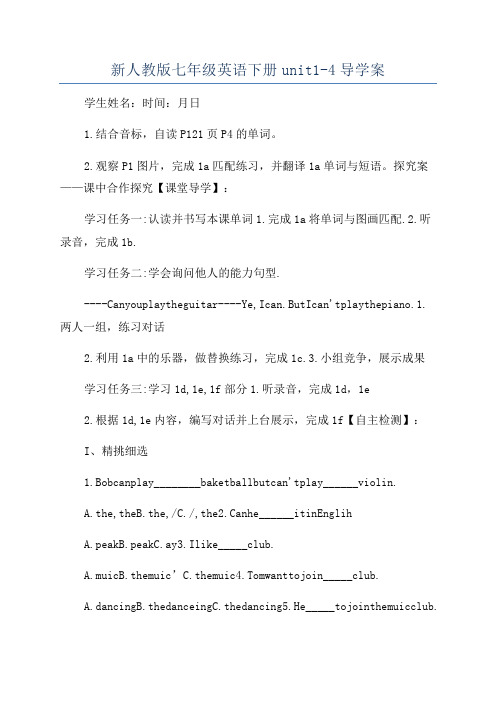
新人教版七年级英语下册unit1-4导学案学生姓名:时间:月日1.结合音标,自读P121页P4的单词。
2.观察P1图片,完成1a匹配练习,并翻译1a单词与短语。
探究案——课中合作探究【课堂导学】:学习任务一:认读并书写本课单词1.完成1a将单词与图画匹配.2.听录音,完成1b.学习任务二:学会询问他人的能力句型.----Canyouplaytheguitar----Ye,Ican.ButIcan'tplaythepiano.1.两人一组,练习对话2.利用1a中的乐器,做替换练习,完成1c.3.小组竞争,展示成果学习任务三:学习1d,1e,1f部分1.听录音,完成1d,1e2.根据1d,1e内容,编写对话并上台展示,完成1f【自主检测】:I、精挑细选1.Bobcanplay________baketballbutcan'tplay______violin.A.the,theB.the,/C./,the2.Canhe______itinEnglihA.peakB.peakC.ay3.Ilike_____club.A.muicB.themu ic’C.themuic4.Tomwanttojoin_____club.A.dancingB.thedanceingC.thedancing5.He_____tojointhemuicclub.A.don’twantB.doen’twantC.wouldlike6.------Aretheygoodat____------A.wimB.towimC.wimmingII、完美呈现1.Canyouplaythev____________2.Hecand_____________anding.3.Iw anttojointheartc___________.4.Doeheplaythep__________everydaythedrum.III翻译句子1.你会唱歌吗是的,我会._________________________________________________________2.我不会弹钢琴,但是我会跳舞._________________________________________________________3.他会弹吉他吗?不,他不会_________________________________________________________3.J ane会下象棋吗不,不会.她会拉小提琴_________________________________________________________。

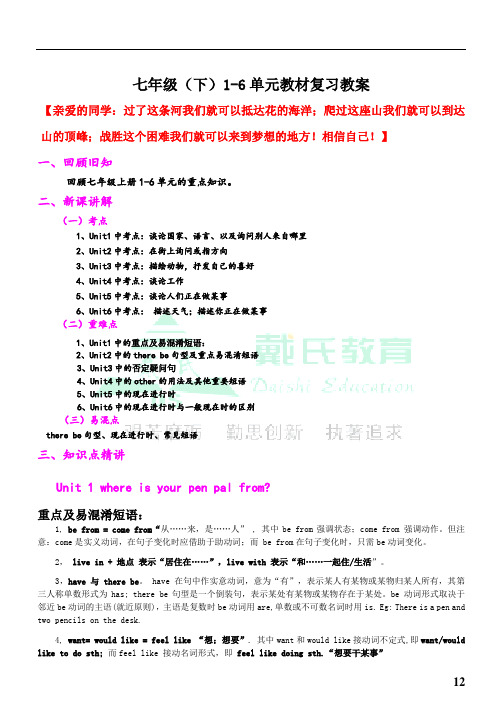
七年级(下)1-6单元教材复习教案【亲爱的同学:过了这条河我们就可以抵达花的海洋;爬过这座山我们就可以到达山的顶峰;战胜这个困难我们就可以来到梦想的地方!相信自己!】一、回顾旧知回顾七年级上册1-6单元的重点知识。
二、新课讲解(一)考点1、Unit1中考点:谈论国家、语言、以及询问别人来自哪里2、Unit2中考点:在街上询问或指方向3、Unit3中考点:描绘动物,抒发自己的喜好4、Unit4中考点:谈论工作5、Unit5中考点:谈论人们正在做某事6、Unit6中考点:描述天气;描述你正在做某事(二)重难点1、Unit1中的重点及易混淆短语:2、Unit2中的there be句型及重点易混淆短语3、Unit3中的否定疑问句4、Unit4中的other的用法及其他重要短语5、Unit5中的现在进行时6、Unit6中的现在进行时与一般现在时的区别(三)易混点there be句型、现在进行时、常见短语三、知识点精讲Unit 1 where is your pen pal from?重点及易混淆短语:1, be from = come from“从……来,是……人” , 其中be from强调状态;come from 强调动作。
但注意:come是实义动词,在句子变化时应借助于助动词;而 be from在句子变化时,只需be动词变化。
2, live in + 地点表示“居住在……”,live with 表示“和……一起住/生活”。
3,have 与 there be。
have 在句中作实意动词,意为“有”,表示某人有某物或某物归某人所有,其第三人称单数形式为has; there be句型是一个倒装句,表示某处有某物或某物存在于某处。
be 动词形式取决于邻近be动词的主语(就近原则),主语是复数时be动词用are,单数或不可数名词时用is. Eg: There is a pen and two pencils on the desk.4, want= would like = feel like “想;想要”. 其中want和would like接动词不定式,即want/would like to do sth; 而feel like 接动名词形式,即feel like doing sth.“想要干某事”5, I think 表示“我认为,我觉得”,后面常接宾语从句,从句表达否定的意思时,要在主句中否定,即I don’t think…… e g: I think he lives in Beijing. → I don’t think he lives in Beijing.(否定前移)。

7下Units 1-4基础训练部分一、记忆训练部分(一)重点词汇梳理1 法国的首都the capital of France2 跟我的狗玩得开心have fun with my dog3 占地面积have an area of4 满是鲜花be full of flowers5 属于某人自己的of one’s own6 足够多的食物more than enough food7 期待做某事look forward to doing sth8 .帮我们处理各种各样的问题help us with all kinds ofproblems9 听起来像个好主意sound like a good idea10 看下面的信息look at the information below11 我的一个老朋友an old friend of mine12 在湖上划船row a boat on the lake13 在农场饲养奶牛/羊raise cows / sheep on a farm14 整天躺着lie down all day long15 为某人准备某物prepare sth for sb.16 在露天区域in an open area17 在街道的拐角at the corner of the street18 听鸟儿唱歌hear the birds sing19 我们组所有成员all our group members20 住宫殿里live in a palace(二)重点句子梳理1 和我姐姐合用一间卧室。
I share a bedroom with my sister.2 客厅是聊天、看电视的最好的地方。
The living room is the best place to chat and watch TV.3 他总是我们班第一个到校的。
He is always the first to come to school inour class.4 我可以为你捎个口信吗?Can I take a message for you?5 恐怕他们不会欢迎像你这样的客人。
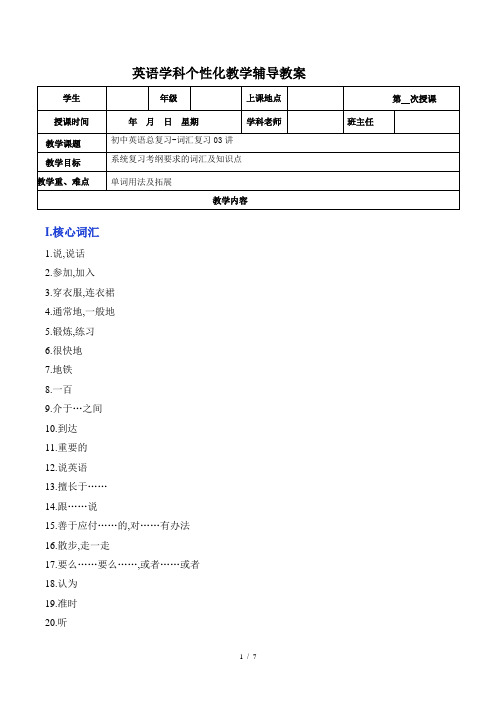
英语学科个性化教学辅导教案I.核心词汇1.说,说话2.参加,加入3.穿衣服,连衣裙4.通常地,一般地5.锻炼,练习6.很快地7.地铁8.一百9.介于…之间10.到达11.重要的12.说英语13.擅长于……14.跟……说15.善于应付……的,对……有办法16.散步,走一走17.要么……要么……,或者……或者18.认为19.准时20.听21.吉他22.唱歌23.游泳24.跳舞25.画26.国际象棋27.写作28.鼓29.钢琴30.小提琴[语境活用]根据短文内容填写单词的正确形式There are too many rules in my home! At 6:00 a.m., my mom 1.(say),“Get up now and 2. (make) your bed!”After breakfast, 3.(I) mom always says,“Don’t leave the dirty 4.(dish) in the kitchen!”After that, I run to school because I 5.( can not) be late. At school, we have more rules—don’t be 6.(noise),don’t eat in class.My dad says I can’t 7.(play) basketball after school because I must do my 8. (homework). I can play only on weekends.After dinner, I can’t relax either. I must read a book before I can watch TV. But I have to 9. (go) to bed before 10:00.Rules, rules, rules! It’s 10.(terribly)! What can I do?II.重点句型1.询问能力的一般疑问句——你会弹吉他吗?——是的,我能。
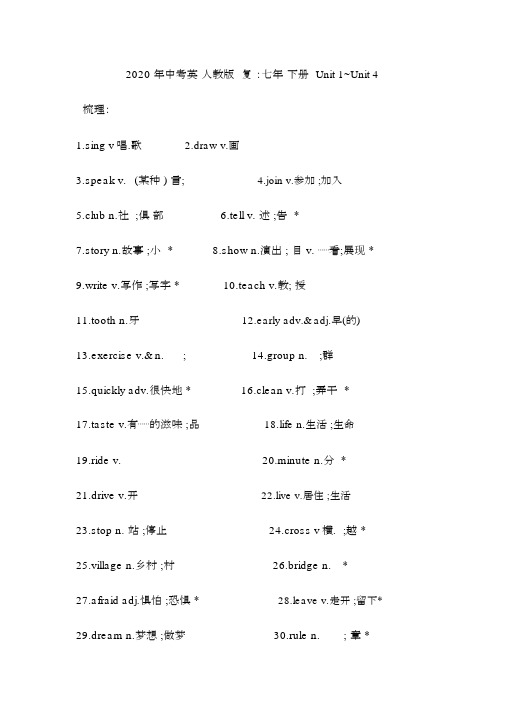
2020 年中考英人教版复:七年下册Unit 1~Unit 4梳理:1.sing v唱.歌2.draw v.画3.speak v. (某种 )言;4.join v.参加 ;加入5.club n.社 ;俱部6.tell v.述 ;告 *7.story n.故事 ;小 *8.show n.演出 ;目 v.⋯⋯看;展现 * 9.write v.写作 ;写字 *10.teach v.教;授11.tooth n.牙12.early adv.& adj.早(的) 13.exercise v.& n.;14.group n. ;群15.quickly adv.很快地 *16.clean v.打 ;弄干 *17.taste v.有⋯⋯的滋味 ;品18.life n.生活 ;生命19.ride v.20.minute n.分 *21.drive v.开22.live v.居住 ;生活23.stop n.站 ;停止24.cross v横. ;越* 25.village n.乡村 ;村26.bridge n.*27.afraid adj.惧怕 ;恐惧 *28.leave v.走开 ;留下* 29.dream n.梦想 ;做梦30.rule n.;章 *31.fight v.& n.打斗 ;战斗32.wear v.穿;戴*33.bring v.带来 ;取来34.quiet adj.寂静的35.practice v.& n.练习 *36.dirty adj.脏的37.kitchen n.厨房38.strict adj.严苛的 ;严格的39.remember v.记着 ;记起 *40.learn v.学习 ;学会 * 41.follow v.按照 ;跟从42.keep v.保持 ;保存词汇拓展1.sing→ singer歌n唱.家2.speak → speaker演n.讲者→ speech n演.讲3.write→ writer作n.者4.piano→ pianist钢n.琴家5.violin→ violinist小n提.琴家6.teach→ teacher老n.师7.music → musician 音n.乐家8.brush→ brushes复(数形式)9.tooth→ teeth复(数形式)ually→ usual adj通.常的;平常的11.quickly→ quick迅adj速.的12.drive→ driver司n机.13.village→ villager村民n.14.luck→ lucky adj好运.的→ luckily adv幸.运地短梳理:1.play chess 下国象棋2.be good at 擅于⋯⋯3.talk to 跟⋯⋯4.be good with 擅长付⋯⋯的;⋯⋯有法5.make friends 交朋友6.on the weekend/on weekends (在)周末7.get up 起床 ;站起8.get dressed 穿上衣服9.take a shower 洗淋浴10.do (one’ s) homework造作11.take a walk 漫步 ;走一走12.either...or... 要么⋯⋯要么⋯⋯;或许⋯⋯或许⋯⋯13.think of;想起14.between...and... 在⋯⋯和⋯⋯之典型例填空。
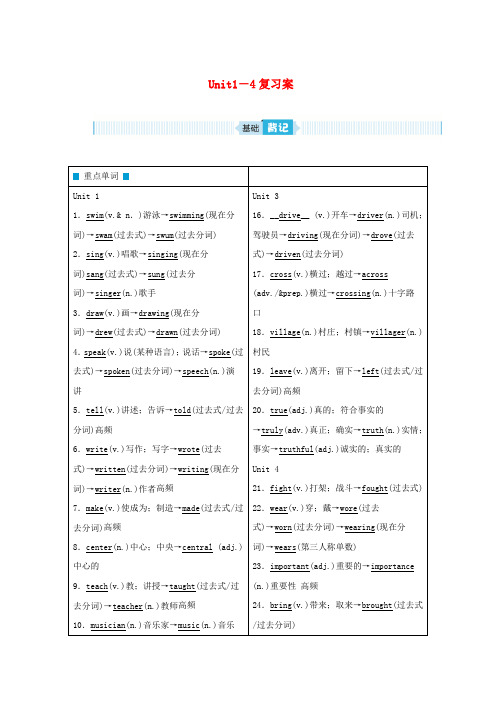
Unit1-4复习案重点单词重点短语重点句型考点play 的用法Well, let's play basketball. 那么,让我们打篮球吧。
Unit 5 P27 (1)play 作动词,图示如下:play soccer 踢足球play chess下象棋play the violin拉小提琴play the music播放音乐总结:①play+球类/棋类②play+the +乐器③意为“播放”(2)play作名词,意为“游戏;戏剧;剧本”。
图示如下:a TV play电视剧1.playing,Tom,likes,the,guitar(连词成句)Tom_likes_playing_the_guitar_______________________________________________ _________________________.2.My brother likes playing D basketball a lot.A.a B.an C.the D./3.A famous A will be performed in our theatre.A.play B.novel C.song D.joke4.Hurry up, Lucy!Come and play B us.A.to B.with C.for D.in考点辨析be good at,be good for与be good withYou're very good at telling stories.你很擅长讲故事。
Unit 1 P25.I am good B maths. I often get good grades.A.to B.at C.of D.for6.Our head teacher is good B us and everyone in our class loves her.A.at B.with C.for D.on7.Exercising every day is good D our health.A.to B.with C.at D.for考点辨析say,speak,talk与tellYou're very good at telling stories.你很擅长讲故事。
新版人教版英语七年级下册英语总复习U1—U4Unit1 Can you play the guitar一、自主学习(一)单词1、gu__t__ __ n.吉他3、sw__m v.游泳5、dr__ __ v.画6、ch__ss n.国际象棋8、sp__ __k v.说;说话9、j__in v.参加;加入10、cl__b n.俱乐部;社团12、t__ll v. n讲述;告诉13、st__ry n故事;小说14、wr__t__ v.写作,写字15、sh__ __ n.演出;表演v.展示;16、o__ conj.或者17、t__ __k v. n说话;谈话20、dr__m n.鼓22、p__ __n__ n.钢琴24、v__ __l__ __ n.小提琴26、al__ __ adv也;而且27、p__ __ple n人;人们30、m__k__ v.使成为;制造32、t__day adv.在今天34、c__ __ter n(=centre)中心,中央35、w__ __k__ __d. n.周末37、t__ __ch v教,讲授38. music __ __ __ n. 音乐家(二)短语:1.help (sb) with sth2.on the weekend.3.make friends4.play chess5.play the violin6.play the drums7.play the piano8.talk to …9.be good at…10.be good with…11.be good for …12.speak English13.English speaking sutents14.tell stories15.story telling club16.want students for school show17.show sb.sth= show sth. to sb.18.show sb. around19.show up20.show off21.at the old people’s home22.be free23.play games with …二、精讲释疑(一) 词汇短语思维导图(二) 重点单词3. “good”短语总结be good for“对……有益”(反义) be bad forbe good at doing sth.“擅长于……”=do well inbe good to“对……友好”=be friendly/nice tobe good with“擅长与某人打交道”4. showshow sb.sth= show sth. to sb. 展示某人某物show sb. around 带某人参观…show up 出现show off 炫耀fashion show 时装表演art show 艺术展览(三) 重点语法1. 定冠词the 的用法:the 表示特指。
表示名词所指的人或事物是同类中的特定的一个,以别于同类中其他的人或事物,相当于汉语中的“那个”或“这个”的意思。
1)“特指”,定冠词的最基本的用法:表示某个或某些特定的人或物。
Do you know the girl in a red skirt? 你认识那个穿红裙子的女孩吗?2)“再指”,再次提到上文提到过的人或物,应该用定冠词the。
例如:Tom has an apple, The apple is big and red.3)“心中所指”指谈话双方都知道的人或物。
例如:Open the door,please!请打开门。
4). 用于某些固定词组中。
例如:in the morning / afternoon / evening 等。
5). 用在形容词前表示一类人。
the old 老人the young 年轻人the rich富裕的人the poor_________ the deaf __________ the blind____________6). 用在表示“姓”的复数名词前,表示一家人或夫妇二人。
例如:The Greens came to China two years ago .7). 用在由普通名词构成的表示场所的专有名词前。
the Great Wall 长城the Summer Place颐和园8).用在序数词或形容词最高级前He is the tallest one in our class.9).世界上独一无二的事物等(月亮、地球、天空、宇宙)The earth goes round the sun.10).在世纪,年代名词前用冠词。
in the 1980s 或in the 1980’s 20世纪80年代11).在江河、山脉、湖泊、海洋、群岛、海峡、海湾运河前用the。
the Changjang River 长江the West Lake 西湖the Pacific Ocean 太平洋12).在介词短语中常用定冠词the,如:in the box ,behind the chair。
13).不能用定冠词the的几个方面:(1)在节日、星期、月份、季节、年等词前不用冠词。
如:in summer, in August 请区别:in the spring of 1945.(这里表示特指,故加the)(2)一日三餐和球类运动名不用冠词。
如:have breakfast ,play football(3)一些固定词组中,如:go to bed ,go to school, by bus ,at night.14).在有些词组中,有冠词和无冠词意思不同,请注意区别:in front of 在…前面, in the front of 在…范围内的前部in hospital (生病)住院, in the hospital 在医院里。
2. “能”说“会”道的can【can的才艺展示】1.表示能力,通常指在体力或脑力方面的能力,意为“能;会”。
如:He can speak English.他会说英语。
2.表示许可,意为“可以”,这时可以和may通用,但是比may较正式。
如:Can I use your pen?我可以用你的钢笔吗?3.表示可能性,意为“可能”,这时常出现在否定句中。
如:It can’t be true.这不可能是真的。
【can的个性展示】1.与动词原形“形影不离”在句中,can不能独立作谓语,必须与动词原形共同充当句子的谓语。
2.没有人称和数的变化当can与动词一起作句子的谓语时,无论主语是第几人称或单数、复数形式,can仍然保持自己的风格,不会发生任何变化。
【can的句式表演】1.肯定句:主语+can+动词原形+其他。
如:Mary can play the drums.玛丽会敲鼓。
2.否定句:主语+can’t+动词原形+其他。
如:He can’t play the piano.他不会弹钢琴。
3.一般疑问句:Can+主语+动词原形+其他?肯定答语:Yes,主语+can.否定答语:No,主语+can’t.如:—Can you play chess?你会下象棋吗?—Yes,I can.是的,我会。
(肯定回答)—No,I can’t.不,我不会。
(否定回答)4.特殊疑问句:疑问词+can+主语+动词原形+其他?如:What can I do for you?我能为你做点什么四、当堂检测the 的用法检测1. The boys often play guitar in afternoon.A.the;/B./;theC.the;theD./;/2. My friend Bob likes to play ____basketball before_______supper. A.the;the B./;the C.the;/ D./;/3. Her sister can play ______ piano, but she ca n’t play _____ basketball. A. the; the B. /; the C. the; / D. /; /can 的用法检测( )1. Can you ______ English A. speak B. talk C. say D. tell( )3. --- ______ you sing? --- Yes, I can. A. Do B. Can C. Are D. Am( )7. ---What club ______ you want to join? --- Chess club. A. does B. do C. can D. are( ) 10. ---- Can you play volleyball?--- Sorry, I ______. A. don’t B. do C. can’t D. can( )13. --- Can he _____ a student?--- Yes. A. is B. be C. are D. does( )15. My brother _______ the trumpet and he play it _____ .A. can plays, goodB. can’t play, goodC. can play, w ellD. doesn’t play, well( )21.Hi, can I help you? ________.A.Yes, please B.No, I can’t C.Yes, I can D.You are welcome 介词用法检测( )11. --- Are you good ______ your students?--- Yes, I am. A. at B. with C. for D. of( )14. We want some singers(歌手) ____ our rock band. A. for B. of C. to D. at( )17.Please call me ________ 8989766. A.in B.at C.about D.with ( )18.________ like to go swimming ________ summer.A.Children, on B.Children, in C.A child, on D.A child, in( )19. Can you help me ________ my English? A.with B.of C.learning D.about ( )23.We want two good ________ our rock band.A.music for B.musician in C.music in D.musicians for重点词汇用法检测( )4. I want to ______ the chess club. A. join B. join in C. join to D. join for ( )5. Tom wants ________ to you. Are you free? A.to tell B.tells C.to talk D.talks ( )25.Can he ________ it in English? A.speak B.speaks C.say D, talk( )9. My brother can play the guitar,______ he can’t play it very wellA. andB. soC. orD. but( )24.Little Tom can draw ________.His drawings are very ________.A.good, well B.well, good C.good, good D.well, wellUnit2 What time do you go to school一、自主学习(一)单词1、up adv 向上2、dr__ss v.穿衣服n.连衣裙3、br__sh v.刷刷净n.刷子4、t__ __th n.(pl. teeth)牙齿5、sh__ __er n.v淋浴;淋浴器(间)6、us__ __ __ly adv.通常地;一般地7、f__ __ty num.四十8. n__ver adv从不;绝不8、__ __ __ly adv. adj早(的)9、fi__ty num.五十10. w__ __k n.& v.工作10、st__t__ __ __ n.电视台;车站11、o'cl__ck adv.(表示整点)…点钟12、n__ __ ___t n.晚上;夜晚13、fun__ __ adj奇怪的;滑稽好笑的14、ex__ __c__s__ v.n锻炼;练习15、b__st adj.& adv.最好的(地)16、h__ __f n.一半,半数17、p__st prep.晚于;过(时间)adj.过去的18、qu__ __t__ __ n.一刻钟;四分之一19、cl__ __n v打扫;;adj干净的20、w__ __k n.&v.行走;步行21、qu__ck__ __ adv很快地22、__ __ther adv或者;也(用在否定词组后)23、t__st__ v.有…的味道;品尝n.味道;滋味24、L__f__ n.生活,生命2. 短语:1)lots of2)take a walk3)Either…or4)do (one’s) homework5)on weekends.6)take a shower7)get dressed8)radio station9)get up 10)be late for work11)it’s time for breakfast12)go to bed early13)play sports14)half an hour15)it’s good for…16)taste good17)in the evening18)have/ live a healthy life二、合作探究1. 思维导图:2. 用学过的单词短语,根据首字母完成短文。